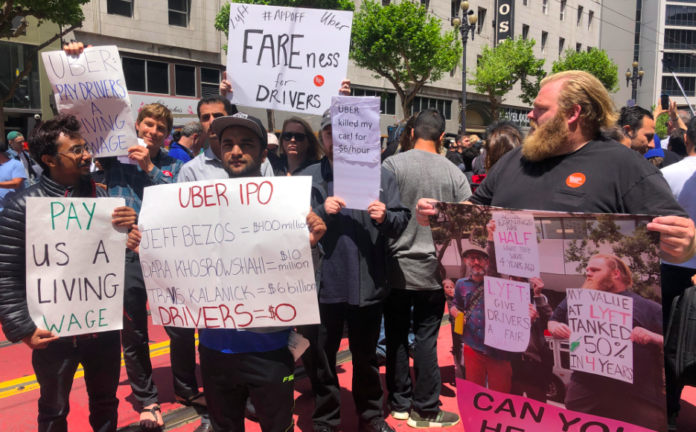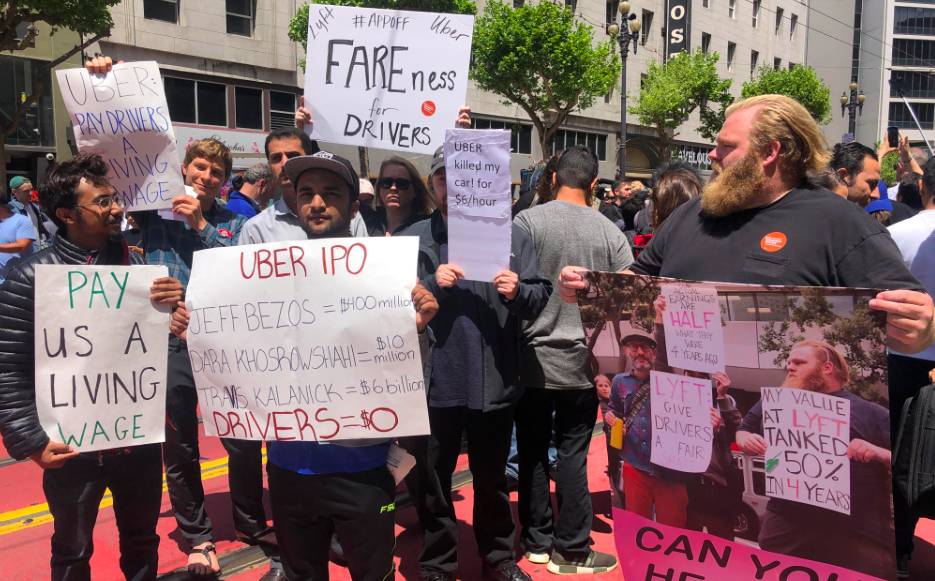
The litany of horror stories at today’s hearing on the gig economy was alarming. One Uber driver said he used to get paid $50 for a trip to the airport; today, it’s $17 – and his costs (gas, maintenance, car payments etc.) have only gone up. Another driver said she had to drop out of school because her job pays so little that she can’t afford books and tuition. Her father drives for Uber and has to sleep in his car because he can’t afford to drive home; he has no health insurance to cover treatment for the painful nerve damage in his leg.

According to Gig Workers Rising, the average Uber or Lyft driver in the city makes less than $12 an hour after expenses; that’s well below the city’s minimum wage. In fact, organizer Rebecca Martinez noted that the typical driver earns $8,260 less every year than should be guaranteed under city law.
Meanwhile, the average Uber corporate employee makes more than $100,000 a year, gets free catered lunches and stock options – and hundreds of dollars a month in free rides.
More than 90 percent of the gig workers in San Francisco are in the transportation industry, but some are also in domestic work – and they had similar stories. The platform companies that are taking over that industry are cutting wages and preventing workers from negotiating with their employers.
Mandelman said that we weren’t seeing the “workplace of the future” – we are seeing the workplace of the past, of the era before the New Deal, before workers won the right to unionize, before the eight-hour day, paid sick leave, and Social Security.
The specific issue at hand is a board resolution in support of AB 5,a state bill that would codify and expand the state Supreme Court’s Dynamex decision, which made it much harder for businesses to classify workers as independent contractors instead of employees.
Under the court ruling, thousands of workers at gig-economy companies could be owed back pay and benefits – which Sup. Gordon Mar suggested could amount to hundreds of millions of dollars.
But the much larger question on the table was the state of work in San Francisco – and the rest of the country – in an era when some tech companies are getting wildly rich in part by refusing to pay minimum wage or benefits for their workers. And 65 percent of those workers, at least in San Francisco, are people of color.
Help us save local journalism!
Every tax-deductible donation helps us grow to cover the issues that mean the most to our community. Become a 48 Hills Hero and support the only daily progressive news source in the Bay Area.
New York City has mandated that Uber and Lyft drivers get a minimum of $17.22 an hour; in just the four months between February and May, the drivers took home an additional $172 million, Ken Jacobs, who chairs the UC Berkeley Labor Center, told the supervisors.
Pat Mulligan, director of the city’s Office of Labor Standards Enforcement, noted that in California, the state has seized regulation of the so-called Transportation Network Companies, making it harder for the city to follow New York’s model. He said that enforcing a minimum wage would require companies to turn over their pay data, which they have so far been reluctant to do, and might result in litigation.
(Jane Martin, a political and community organizer with SEIU USWW, noted that the city shouldn’t let “an army of corporate lawyers” force it to back down.)
Still, the overall message of the hearing was that the current situation is untenable. Mandelman summed it up at the end, when he called the evidence “horrifying:”
I think of the arrogance of the people a decade ago who promised “disruption” – and boy, have they delivered. People are dying on the streets because of the congestion, the harm to our public transportation, the harm to the taxicab industry, the lives we hear about every week at our board meetings, the litany of labor practices undermined. .. We need to look at what we can do locally, to see that we are enforcing every single legal remedy.
I remember a decade ago, when “disruption” was not only a watchword in tech circles – it was fully supported at City Hall. I remember when the late Mayor Ed Lee refused to enforce the city’s laws against illegal taxis, allowing Uber and Lyft to get a foothold. I remember when a majority of the Board of Supervisors, including the current mayor, London Breed, the current state Assemblymember David Chiu, and current state Senator Scott Wiener, sided with Airbnb and rejected any meaningful regulations.
It wasn’t just “the people who promised disruption” that created this human crisis in San Francisco; it was the elected officials who either encouraged it or ignored the obvious violations of law and let it happen.
Now we are paying the price.
